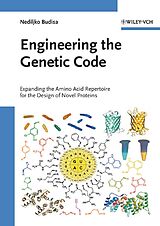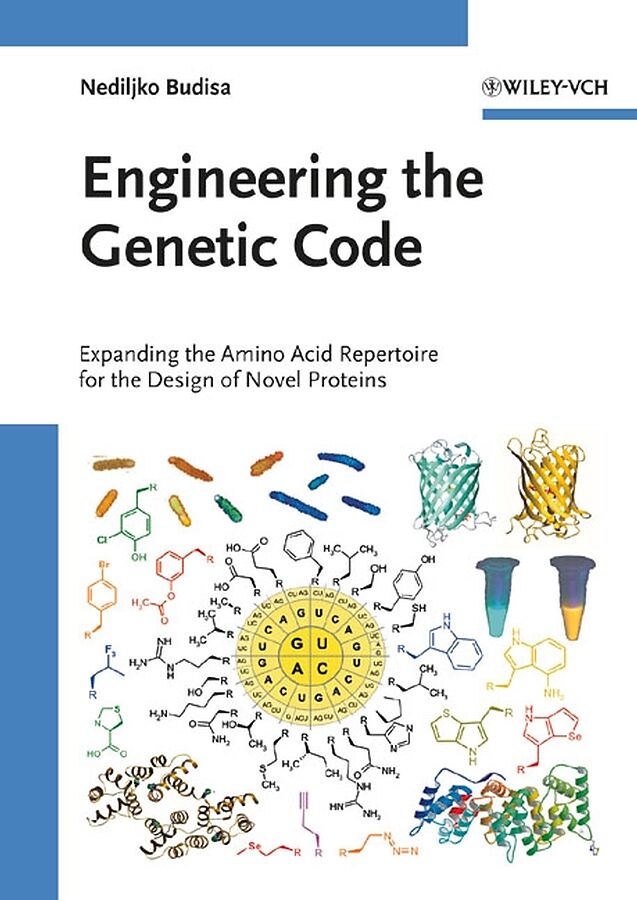Engineering the Genetic Code
Einband:
Fester Einband
EAN:
9783527312436
Untertitel:
Expanding the Amino Acid Repertoire for the Design of Novel Proteins
Genre:
Chemie
Autor:
Nediljko Budisa
Herausgeber:
Wiley-VCH
Auflage:
1. Auflage
Anzahl Seiten:
312
Erscheinungsdatum:
26.10.2005
ISBN:
978-3-527-31243-6
Here, the different methods and strategies to incorporate new or modified amino acids are explained in detail, including a lot of practical advice for first-time users of this powerful technique. Essential reading for all molecular life scientists who want to stay ahead in their research.
The ability to introduce non-canonical amino acids in vivo has greatly expanded the repertoire of accessible proteins for basic research and biotechnological application. Here, the different methods and strategies to incorporate new or modified amino acids are explained in detail, including a lot of practical advice for first-time users of this powerful technique. Novel applications in protein biochemistry, genomics, biotechnology and biomedicine made possible by the expansion of the genetic code are discussed and numerous examples are given. Essential reading for all molecular life scientists who want to stay ahead in their research.
Autorentext
Nediljko Budisa is a group leader at the Max-Planck-Institute of Biochemistry in Martinsried near Munich (Germany). He studied Chemistry and Biology at the University of Zagreb (Croatia) before joining the group of Nobel Prize Winner Robert Huber at Martinsried to obtain his PhD degree. During postdoctoral work with R. Huber and L. Moroder he led an independent research team in protein engineering. In 2004, Dr. Budisa received the BioFuture Award of the German Federal Ministry for Research and Education.
Klappentext
The chemistry of the life is based on defined number of the generic monomeric building blocks. For example, twenty canonical alpha-amino acids are encoded for basic protein syntheses in all organisms. The central issue of this book are experimental strategies and techniques to expand the number of the amino acids for protein biosyntheses. This requires the reprogramming of protein translation machinery by changing the coding capacities of standard genetic code - a main goal of the genetic code engineering as new research field. Such genetically encoded protein modifications achieved by introducing non-canonical amino acids both in vitro and in vivo have greatly expanded the repertoire of accessible proteins for basic research and biotechnological application. The researchers and students are provided with a comprehensive coverage of important new principles of different methods and strategies to incorporate new or modified amino acids into proteins including a lot of practical advice for first-time users of these powerful approaches. Numerous examples, made possible by the expansion of the genetic code, are given in order to cover the entire spectrum of novel applications in protein biochemistry, genomics, biotechnology and biomedicine. Some other interesting aspects discussed in this book include the relations between prebiotic (extraterrestrial, meteoritic, interstellar) and encoded amino acids; the possibility to couple engineered metabolic circuits with reprogrammed translation; to remodel current life and progressively develop truly novel life forms, as well as possible ethical implications of such experiments on human societies. Essential reading for all molecular life scientists who want to stay ahead in their research.
Inhalt
INTRODUCTION Classical Approaches for Protein Modification Protein Total Synthesis Basic Definitions and Taxonomy HISTORY OF AN EXPANDED AMINO ACID REPERTOIRE Cell-free Synthesis of Proteins Noncanonical Amino Acids as Tools for Studying Metabolism Genetic Code Engineering BASIC FEATURES OF THE CELLULAR TRANSLATION APPARATUS Ribosome-mediated Protein Synthesis tRNAs and tRNA Synthetases Translational Proofreading Ribosomal Decoding, Codon Bias and Translational Fidelity Context-dependent Recoding Post-translational Modifications GENETIC CODE ORGANISATION AND PROTEIN STRUCTURE The Universal Genetic Code Natural Variations in Codon Assignment Codon Reassignment and Codon Ambiguity REPROGRAMMING THE CELLULAR TRANSLATION MACHINERY Enzyme Specificity and Code Interpretation Reassigning Coding and Non-Coding Units In vitro Chemical and Enzymatic tRNA Aminoacylation Novel Codon-Anticodon Base Pairs Stop Codon Takover Suppression-Based Methods Future Approaches IMPLICATIONS AND INSIGHTS Evolution of the Amino Acid Repertoire Artificial Genetic Systems De novo Design of Organisms Chances and Risks APPLICATIONS FOR REPROGRAMMED CELLULAR TRANSLATION Genetically Encoded Protein Surface Diversity Applications in Structural Biology Atomic Mutations Protein Folding, Stability and Design Tailoring Protein Spectroscopy Protein-based Sensors Applications in Biomedicine Noncanonical Amino Acids with Neurological Activity

Leider konnten wir für diesen Artikel keine Preise ermitteln ...
billigbuch.ch sucht jetzt für Sie die besten Angebote ...
Die aktuellen Verkaufspreise von 6 Onlineshops werden in Realtime abgefragt.
Sie können das gewünschte Produkt anschliessend direkt beim Anbieter Ihrer Wahl bestellen.
Loading...
Die aktuellen Verkaufspreise von 6 Onlineshops werden in Realtime abgefragt.
Sie können das gewünschte Produkt anschliessend direkt beim Anbieter Ihrer Wahl bestellen.
| # | Onlineshop | Preis CHF | Versand CHF | Total CHF | ||
|---|---|---|---|---|---|---|
| 1 | Seller | 0.00 | 0.00 | 0.00 |
